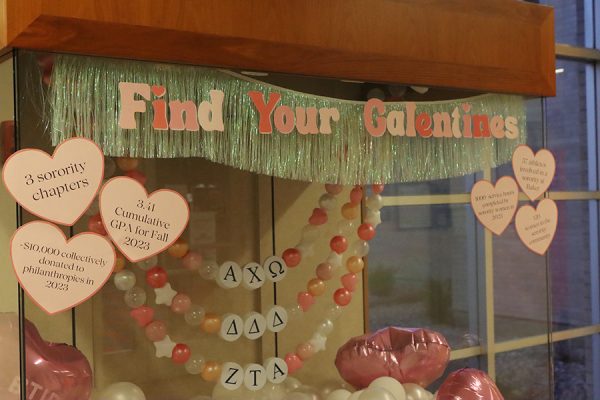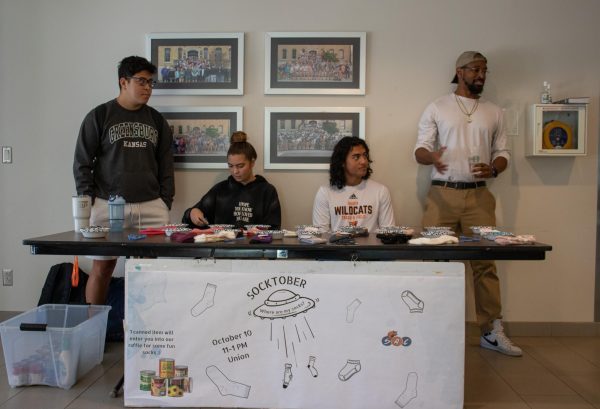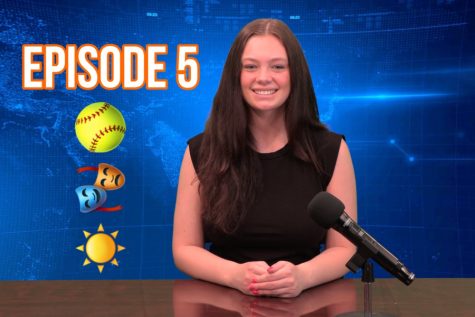Boston Marathon bombings bring community together through Harris family
April 22, 2013
To any marathon runner, seven-tenths of a mile from the finish line is so close, yet so far away.
For Sarah Harris, seven-tenths of a mile potentially saved her life.
Sarah, a 1996 Baker graduate, was at the 25.5 mile marker of the Boston Marathon on April 15 when she and the other runners were told to get off of the streets because there were explosions from two bombs near the finish line.
At the time, Sarah had no idea what was going on, as the noise and energy of the crowd was too overwhelming to hear anything else.
“I was probably about half a mile from finishing and they stopped everybody and … it had to be something serious for them to stop the Boston Marathon,” Sarah said. “There were lots of emergency vehicles and police cars, ambulances driving by, and then within probably about 30 seconds to a minute, people started talking about there was a bomb at the finish line.”
Sarah qualified for the Boston Marathon in St. Louis in 2011, where she ran about 3 hours, 39 minutes. When she initially started training for Boston, she was on track to run her goal time of 3:30.
However, because of a knee injury, she felt she was undertrained. Whether it was good timing or a “blessing in disguise,” the knee injury kept her from running to her full potential. By the time the race was stopped, she was off of her goal time pace and simply had a goal to finish the race. The injury may have made the difference—seven-tenths of a mile—that kept her from finishing at the time of the explosions.
“Everything happens for a reason, I suppose,” Sarah said. “It slowed me down, and had I finished any sooner, then I could’ve been right there amongst everything. So it could’ve been a blessing in disguise and that’s why I was hurt and wasn’t there.”
Meanwhile, Sarah’s husband, Kit, a 1995 Baker graduate, and their 13-year-old son, Cael, were on a Boston subway on the way to see Sarah cross the finish line. The last time Sarah had seen them was at about mile 22, where they told her they’d see her at the finish.
“My first thought was, ‘oh my gosh, they’re at the finish. I hope they’re OK,’” Sarah said. “I didn’t know what the magnitude of it was. I didn’t know how big it was and how far it reached, so that was a huge concern.”
Dan Harris, former BU athletic director and father of Kit Harris, said he saw news of the explosions and was immediately concerned. However, it wasn’t until about an hour later that he could contact his son.
“It was a while, because the first thing that they were announcing on TV was they were asking people not to use their cell phones in the area,” Harris said. “And so they shut down cell phone service temporarily. It was probably … at least 45 minutes to an hour before I actually could talk to my son.”
Back in Boston, Kit and Sarah were taking all measures to find one another. A group of three women took Sarah under their wings and led her to a hotel, where they gave her a jacket and let her use a cell phone to communicate with Kit.
At the time, Kit’s cell phone was being bombarded with calls and text messages, as friends and family members were calling to ensure his and his family’s safety.
“We know that we all rely on our cell phones for communication. We don’t realize how much so until there’s an emergency and it doesn’t work,” Kit said. “It was crazy. My phone would be searching for signal for a long time and then all of a sudden when it would connect, I’d get about 15 texts all of a sudden come right in. I would try to reply to one, and I’m trying to type and it kept going to the new message screen. I’d get off of that and go back to the message and again it would come up, new message.”
In order to save his phone to communicate with Sarah, Kit told a few people, including his father, to post on Facebook that they were fine and to stay off of his phone.
“What I had to do is I got about four friends in Baldwin, and I said, ‘Everybody put a post on their Facebook site and tell them to not contact Kit’s cell phone, either phone call or text. He needs to save that time and those minutes for emergency communication,’” Dan said. “That really helped a lot. The people of Baldwin really stepped up. It was really cool how they put that on their Facebook. Social media was the way to communicate.”
Kit had been watching the race with John Bones, a former student of his from Baldwin City, who is now in the Army Reserve. Bones was in Boston for a job assignment and had contacted Kit to watch the marathon with him. Bones knew the streets of Boston and was a crucial part in helping Kit and Sarah find each other. He also helped retrieve Sarah’s bag, containing items such as her cell phone, money and some clothes, from an area near the finish line.
“He knew all the ways to go, and he stayed with us the whole time,” Kit said. “He was an unbelievable help.”
Other members of the Baldwin City community have been “pretty incredible,” as well, as neighbors and friends welcomed the Harris family home with a finish line set up for Sarah to cross, complete with a medal and a meal afterward.
“I’ve lived here since 1983,” Kit said. “It’s been a long time, and I’ve always known it’s a pretty close-knit and special community, but at times like this, you feel it even more so.”
After much of the nation watched the events unfold from televisions at home, members of the Harris family have returned home and are now reliving the day’s events over and over again with each news broadcast.
What they’re seeing aren’t just images on a TV screen. They are images they saw with their own eyes.
“It feels extremely real. They’re showing images and sights,” Kit said. “I saw that. I saw the chaos. I saw the fear in people eyes. I saw the emergency personnel rushing in to help.”
The first-hand experience extends to the rest of the Harris family, as Dan was sitting at home that day with Kit and Sarah’s other two children, Malin, 6, and Ty, 11.
“I’m watching this stuff on the news and trying to comfort young children in terms of what’s going on. I was so amazed at my 11-year-old grandson who’s sitting next to me at their house watching this stuff on TV …,” Dan said. “Out of the clear blue, he asked me, ‘What’s al-Qaeda, grandpa?’ Here’s a 10, 11-year kid in this culture, understands terrorism. … Our kids today are exposed to this stuff and their level of maturity just absolutely amazes me.”
Dan sees the marathon bombings as an act that doesn’t destroy the American people, but rather unites and empowers them to ensure safety and well-being, just as the Baldwin City community rallied around the Harris family last week.
“These terrorists … they have this belief that if they don’t believe what we believe then they have to kill us,” Dan said. “This attitude, they’re trying to make our lives miserable when their life is miserable. My whole feeling is, they’re not destroying our character or our emotions at all. What they’re doing is they’re making the American people step up and take action.”
Despite the pain, fear and struggles she felt that day, Sarah’s character, emotions or spirits about running have not been dampened at all, and she hopes to return to Boston to race in the future.
“I really would like to do it again, so I’m looking to hopefully going back hopefully next year,” she said, “but we’ll see what happens.”







